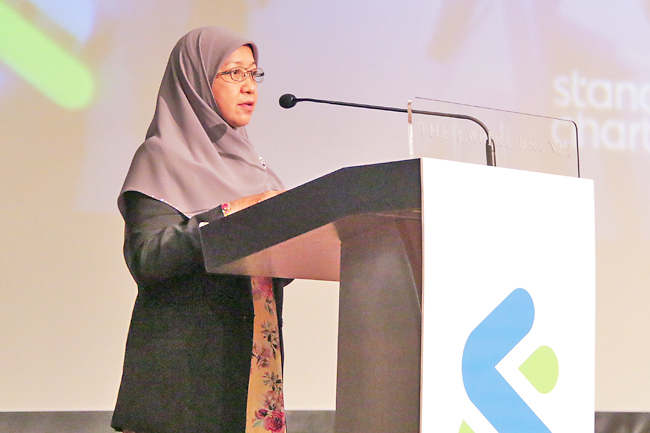Izah Azahari
Inflation is a global concern, with central banks around the world tightening monetary policies while being mindful of the possibility and potential consequences of a recession, which could derail post-pandemic recovery and introduce additional risk to highly-leveraged corporates and households.
This was said by Brunei Darussalam Central Bank (BDCB) Managing Director Hajah Rokiah binti Haji Badar in her keynote address during a Standard Chartered global research briefing at the Indera Samudra Grand Hall of The Empire Brunei yesterday.
Geopolitical risks continue to cause vulnerabilities in global economic growth and distort the predictability of financial markets in the fourth quarter of this year.
The spillover effects from the conflict between Russia and Ukraine are pushing energy prices up, and have now accelerated inflation beyond forecasts.
The managing director cited a recent statement from the International Monetary Fund (IMF) that business conditions in the last three months have darkened significantly, and that the risk of a global economic recession is rising.
“The social impact of inflation is also being carefully monitored as the income inequality gap that widened in the wake of the pandemic could be further exacerbated with fast rising prices,” said Hajah Rokiah.
On the conditions in the Sultanate, she said that rising prices are often featured as a concern in daily conversations.


Though inflation is rising at a more manageable pace in the Sultanate compared to many economies around the world, businesses and households have had to adjust their spending significantly, she said.
“Many businesses interviewed in BDCB’s monthly Business Sentiment Index survey have shared their concerns regarding rising operational costs stemming from more expensive raw materials, as well as high transportation and logistics costs that erode their profit margins,” she added.
The managing director added that despite the relatively higher inflation averaging at 3.3 per cent in the first quarter of 2022, the domestic economy is expected to hold up well this year with higher government revenue from elevated oil prices, further relaxation of COVID-19 restrictions, and several ongoing foreign direct investment (FDI) projects.
She went on to share that after a 1.6-per-cent contraction in 2021, the Department of Economic Planning and Statistics (DEPS), Ministry of Finance and Economy, forecasted gross domestic Product (GDP) growth rate to be within the range of 0.4 to 0.8 per cent in 2022.
“The non-oil and gas sector is expected to be the primary growth driver contributing between 6.3 to 7.0 per cent while the contribution is expected to decline by about 5.2 per cent.”
She further shared that there are heightened concerns that the confluence of numerous downside risks could tip some countries into recession in the near to medium-term, and that the IMF has revised down its global growth forecast for the third time this year from 3.6 per cent to 3.2 per cent for 2022, and from 3.6 per cent to 2.9 per cent for 2023 to reflect the impact of, among other factors, rising inflation, aggressive interest rate hikes by central banks, a slowdown in global economic growth and sanctions against Russia.
“The financial markets are not spared from these impacts. We are also facing a unique situation as we observed that the typical negative correlation between equity and bond markets no longer holds,” said the BDCB managing director.
Both the bond and equity markets are indeed heavily affected by the rising global inflation with the surging inflation and the rapid interest rate hikes by the Federal Reserve have sent bond yields up and prices sharply lower, detrimentally impacting Fixed Income investments on one hand, and MSCI World Index has declined by 15 per cent year-to-date, as businesses continue to be affected by the higher costs of production and investors need to look harder in search of returns on the other hand.
Hajah Rokiah also noted the market meltdown in cryptocurrencies and stablecoins in the past few months which have pushed global financial regulators to call for tighter oversight of such virtual assets, with concerns on the extreme volatility and vulnerabilities that could impact other assets. International standard setting bodies such as the International Organization of Securities Commissions (IOSCO) have published a roadmap for crypto-asset regulation earlier this month, outlining its ambition to lay down a basic framework of principles and recommendations to address risks across the crypto-asset ecosystem and to apply them globally, in the next 12 to 24 months.
“While the use of cryptocurrencies and stablecoins is not yet prevalent domestically, BDCB foresees this to be a potential risk area and is also working on putting in place the necessary frameworks to bring such crypto-assets into its regulatory fold and to address such harms,” she added.
While all of these issues may seem overwhelming for entities around the globe, the managing director said they bring about the very important lesson on resilience that is the ability to withstand unpredictable threats or changes and to emerge stronger.
“Few could have predicted the perils we face today, and things may continue to be unpredictable in the future. All one could and should do is be prepared,” said Hajah Rokiah.
She highlighted His Majesty Sultan Haji Hassanal Bolkiah Mu’izzaddin Waddaulah ibni Al-Marhum Sultan Haji Omar ‘Ali Saifuddien Sa’adul Khairi Waddien, Sultan and Yang Di-Pertuan of Brunei Darussalam’s government diversification and digitalisation initiatives as outlined in the Economic Blueprint and the Digital Economy Masterplan are well underway to support future economic developments that will spur sustainable growth in the country. Moreover, the corresponding frameworks and infrastructures are envisaged to be able to weather both acknowledged and unexpected shocks.
Complementing the initiatives, Hajah Rokiah said BDCB continues on its pursuit to further develop and diversify the financial services sector that will serve as a catalyst to economic growth. Through the strategies chartered in the Financial Sector Blueprint and Digital Payment Roadmap, BDCB aspires to create a conducive environment that can cultivate the growth of a dynamic and diversified financial services sector equipped with the ability to withstand shocks and vulnerabilities.
“Like many central banks or regulators, BDCB has also strengthened its regulatory frameworks and put in place important prudential safeguards. Financial institutions are more robust and continue to be safe and sound, as what we have seen throughout the past two years. But we will not be complacent because the current chain of events is unprecedented,” said Hajah Rokiah.
With active collaboration between policy-makers and the industry players, the BDCB managing director believes the Sultanate will emerge from this challenging time standing tall as the headwinds facing the global economy and financial markets are likely to persist for a while.
“However, what defines us are our responses and strategies in navigating through this turbulent time,” said Hajah Rokiah prior to concluding her keynote address.







